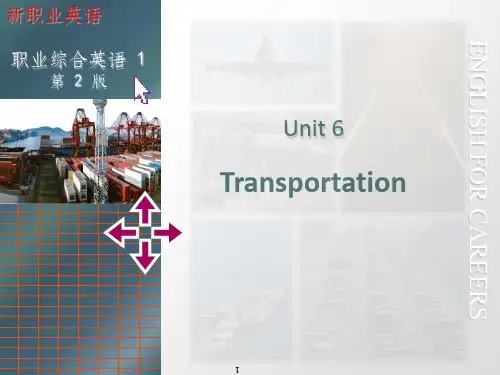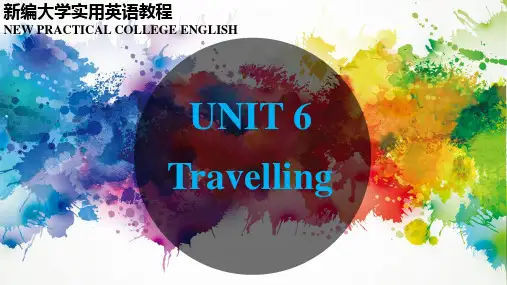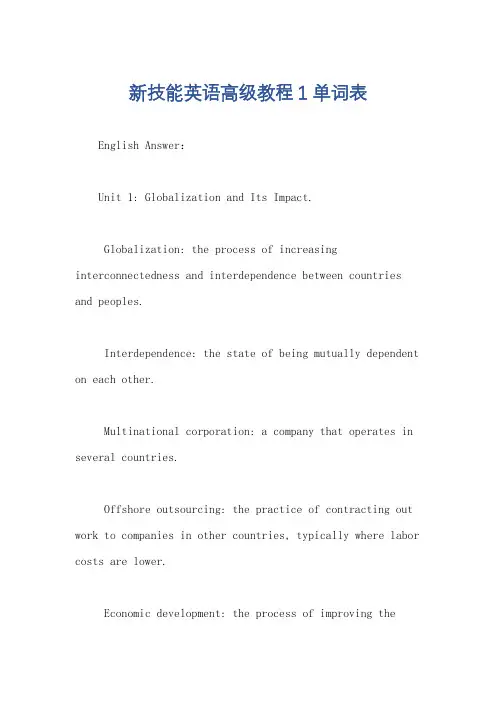新技能英语基础教程1unit6
- 格式:ppt
- 大小:44.84 MB
- 文档页数:56










新技能英语高级教程1单词表English Answer:Unit 1: Globalization and Its Impact.Globalization: the process of increasing interconnectedness and interdependence between countries and peoples.Interdependence: the state of being mutually dependent on each other.Multinational corporation: a company that operates in several countries.Offshore outsourcing: the practice of contracting out work to companies in other countries, typically where labor costs are lower.Economic development: the process of improving theeconomic well-being of a country or region.Human development: the process of expanding human capabilities and choices.Sustainable development: development that meets the needs of the present without compromising the ability of future generations to meet their own needs.Unit 2: Technological Advancements.Artificial intelligence (AI): the ability of computers to perform tasks that normally require human intelligence.Blockchain: a distributed database that is used to maintain a continuously growing list of records, called blocks.Cloud computing: the delivery of computing services over the internet.E-commerce: the buying and selling of goods orservices over the internet.Internet of Things (IoT): the network of physical devices that are connected to the internet.Machine learning: the ability of computers to learn without being explicitly programmed.Virtual reality (VR): the use of computer technology to create a simulated environment that can be experienced by the user.Unit 3: Environmental Challenges.Climate change: the long-term alteration of temperature and typical weather patterns in a place.Deforestation: the clearing of forests.Desertification: the process by which land becomes desert.Environmental degradation: the damage or destruction of the natural environment.Extinction: the dying out of a species.Global warming: the gradual increase in the average temperature of the Earth's atmosphere.Pollution: the contamination of the natural environment with harmful substances.Unit 4: Social and Cultural Changes.Cultural diversity: the variety of cultural practices and beliefs that exist in a society.Cultural identity: the sense of belonging to a particular culture.Cultural relativism: the belief that all cultures are valid and should be respected.Globalization of culture: the spread of cultural practices and beliefs across national borders.Intercultural communication: communication between people from different cultural backgrounds.Social change: the transformation of socialinstitutions and practices over time.Social inequality: the unequal distribution of resources and opportunities in a society.Unit 5: Global Health and Well-being.Access to healthcare: the ability to obtain healthcare services when needed.Communicable diseases: diseases that can be transmitted from one person to another.Global health: the health of people around the world.Health disparities: the differences in health outcomes between different groups of people.Non-communicable diseases: diseases that are not transmitted from one person to another.Public health: the science and art of preventing disease, prolonging life, and promoting health through organized efforts.Universal health coverage: the provision of health services to all people, regardless of their ability to pay.Unit 6: International Relations.Diplomacy: the conduct of international relations through negotiation and dialogue.Foreign policy: the policy of a government towards other countries.Globalization of politics: the increasinginterconnectedness and interdependence of political systems around the world.International law: the body of law that governs relations between states.International organizations: organizations that are composed of member states and that work to promote cooperation among them.National security: the protection of a country from threats to its security.War: a state of armed conflict between two or more countries.中文回答:单元 1,全球化及其影响。

Unit 6 I’d like some fried fish with vegetables.一、学情分析本单元的话题是点餐和就餐。
教学重点是能够使用基本的单词和句型进行点餐。
具体为能够说出常见的食物、饮料的英文名称;能够进行点餐的对话;能够表达食品的基本味道、分量或生熟等;能读懂关于就餐或食品介绍简单的文章;了解一些不同文化的食品;同时培养学生健康的饮食态度。
本单元的语法点为形容词、副词的比较级和最高级。
本单元点餐和就餐这个话题,和学生的生活联系比较紧密。
就基本食品、饮料的词汇和句型而言,学生在以前的学习中也有所接触。
本单元既是对以前词汇和句型学习的一个总结和复习,又增加了西餐和快餐等比较流行的词汇,吸引学生的兴趣。
因此,针对中职学生遗忘率较高的实际情况,教师通过合理的设计帮助学生复习的同时,融入新内容,有效的完成词汇听、说、读、写四个任务,重视运用。
在学习食品和饮料中,拓宽学生的视野,了解各国美食,潜移默化中培养学生健康的饮食习惯。
本单元设计成四个课时:第一课时 Lead in + Listening and speaking第二课时 Reading and writing第三课时Grammar focus (Comparative and superlative degrees)第四课时 Vocabulary practice + Supplementary reading二、分课时教学设计第一课时 Lead in + Listening and Speaking一、教材分析1.教学内容本课时系教材《英语基础教程》(1)第六单元的第一课时,包括Lead-in & Listening and speaking两部分,具体内容为:能够说出常见的食物、饮料的英文名称;能够进行点餐的对话;能够表达食品的基本味道、分量或生熟等。
2.教学重点、难点⑴教学重点点餐的词汇和句型:能够说出常见的食物、饮料的英文名称;能够进行点餐的对话;能够表达食品的基本味道、分量或生熟等。
English for Careers 1Unit 6 TransportationUnit Focusbe characterized by lie in compare favorably with bulkyin relation to what matters the most advantageous delivery economical volume maintenance give way to the key to...Teaching proceduresThis unit is arranged for a time span of 8 hours, during which a time limit is suggested for each step. Though it’s always important to keep a time limit in mind for each activity, a teacher should never stick to a rigid time plan in teaching, but rather follow a more flexible time table when dealing with unexpected in-class occurrences and make necessary adjustments accordingly.Note that not every step suggested here is a must in teaching. A teacher can make whatever changes he thinks necessary.Hour 1:Course introduction 45 minutesWarming-upTask 1 10 minutes Objective: Ss can identify some world-famous express companies.Steps:• Ss read Warming-up Task 1.• Go through logos 1-4 with Ss.• Get Ss to match the logos with their company names.• Give the key.Key: A–4 B–1 C–3 D–2Task 2 10 minutes Objective: Ss can identify some typical shipping labels.Steps:• Ss read Warming-up Task 2.• Get Ss to do the task individually before they discuss their answers with others.• Ask some Ss to present their work.• Give the key.Suggested Answers:You should(Picture 1) isolate it elsewhere.(Picture 2) not stack it with other stuff.(Picture 3) not use hooks to lift it up.(Picture 4) place it with this side up.(Picture 5) handle with care.(Picture 6) keep it dry.New words in Reading A 15 minutes Objective: Ss can get familiar with the new words and expressions, etc..Steps:• Ss listen to the new words and expressions, etc.• Ss read the new words and expressions, etc.Notes: For a class with higher English proficiency, the teacher may follow the following steps:• Ss preview the new words and expressions.• Ss read the new words and expressions.• Ss dictate several important new words and expressions.Discussions before Reading A 10 minutes Objective: Ss can get familiar with the new words and expressions, etc..Steps:• Ss know something about Reading A.• Ss discuss the following two questions:1.How many modes of transport do you know? List five major modes of transportfor goods.2.Which transportation should be used when the goods are medicines?• Comment briefly on their work.Hours 2-3:Reading A 45 minutes Language points 35 minutes Paragraph 1be characterized by: to have the character or qualities ofe.g. Your work is characterized by lack of attention to details.Paragraph 2lie in: (of ideas, qualities, problems, etc.) to exist or be founde.g. The problem lies in deciding when to expand the business.compare favorably with: to be better in nature or quality in relation to anothere.g. She was pleased that her work compared favorably with her sister’s.Paragraph 3bulky: a. large and difficult to move or carrye.g. Bulky items will be collected separately.in relation to: connected with or compared with somethinge.g. Women’s earnings are still low in relation to men’s.what matters the most: what is the most importante.g. What matters the most is the way you look at your life.Paragraph 4advantageous: a. good or useful in a particular situatione.g. A free trade agreement would be advantageous to both countries.delivery: n. the act of taking goods, letters, etc. to a particular person or placee.g. Please pay for goods on delivery.Paragraph 5economical: a. not spending more money than necessarye.g. A small car is more economical to run.He was economical in all areas of his life.c.f. economic: a. of or relating to the production, development and management ofmaterial wealth, as of a country, household or business enterprise; of or relating to an economyvolume: n. the amount of something; the amount of space that an object takese.g. The volume of traffic on the roads has increased dramatically in recent years.The volume of the container measures 10,000 cubic meters.maintenance: n. the act of keeping something in good condition by checking or repairing it regularly; the act of making a state or situation continuee.g. The school pays a lot of money every year for heating and the maintenance of thebuildings.All countries are responsible for the maintenance of international peace. Paragraph 6give way to: to be replaced bye.g. Excitement gave way to fear as she stepped on the stage.spare part: a new part that one buys to replace an old or broken part of a machine, etc.the key to...: the vital, crucial element that makes one able to understand or achieve somethinge.g. Working well as a team is the key to success.Task 1 5 minutes Objective:Ss can find some specific information in the passage.Steps:• Ss do Task 1.• Ask Ss to work individually.• Check the answers.Suggested Answers:Task 2 5 minutes Objective:Ss can understand the passage.Steps:•Ss do Task 2.• Ask Ss to work individually.• Check the answers.Suggested Answers:1. E2. E3. A, E4. D5. A6. B7.B 7. A, CLanguage lab 45 minutes Task 1 5 minutes Objective:Ss know the spelling and meaning of the words and expressions from Reading A.Steps:• Ss read Task 1.• Allow Ss 5 minutes to do the task.• Check the answers.KeyKey: 1. F 2. H 3. E 4. C 5. D 6. A 7. J 8. B 9. I 10. G Task 2 10 minutesObjective:Ss can use the words and expressions from Reading A.Steps:• Ss do Task 2.• Ask Ss to work individually.• Check the answers.Answers1. namely2. delivery3. give way to4. transport5. volume6. lies in7. advantageous8. maintenance9. bulky 10. economicalTask 3 10 minutes Objective:Ss can express ideas in writing using the two models outlined for Task 3. Steps:• Read the models to Ss with an explanation if needed.• Ss work in pairs.• Check the answers.Key:Model 11. The cost of production is what we are thinking about right now.2. Lack of water is not what causes the problem.3. To accept the price is what he meant by saying “OK”.Model 21. Sally has to finish the task in one day, which is very difficult for her.2. John was late for the meeting again, which is very bad for a group leader.3. They grew up in that village, which is something they can never change.Task 4 10 minutes Objective: Ss can express ideas in the words or expressions in the brackets. Steps:• Ss do Task 4.• Ask Ss to work individually.• Check the answers.Key:1. For some people, happiness simply lies in health and love.2. To finish this report, we need more specific information instead of general descriptions.3. Her writing is characterized by simple words and clear ideas.4. Their products compare favora bly with others’ in both quality and price.5. Of all the five steps, the third one is optional.Task 5 10 minutes Objective:Ss can use the vocabulary in Reading A for translation.Steps:• Ss work individually or in pairs and translate the sentences.• Ask two Ss to write their translations on the board.• Comment briefly on their work with emphasis on the structures of their sentences. Key:1. This aircraft company began to deal with freight this year.2. My problems are almost nothing in comparison with yours.3. The door looks too wide in relation to its height.4. Another company has offered more advantageous terms than yours.5. The countryside gradually gave way to various buildings as the city grew.6. Our hotel provides free breakfast for every guest.7. The charge for the use of the public telephone is one yuan per time.8. The two parties agreed to sign the contract.Hours 4-5:Listening 45 minutes Task 1 5 minutes Objective:Ss can answer the questions.Script:W: Hello, Customer Service Department. How can I help you?M: Hello, I’m trying to find out if my order has been shipped.W: OK. Could I have your order number, please?M: Yes, it’s 9807.W: Thank you. Wait a minute. Yes, your order was shipped on the eighteenth.M: OK. Thanks.W: You’re welcome. Bye.M: Bye.Key: 1. 9807 2. On the eighteenthTask 2 10 minutes Objective:Ss can accurately write down the missing information.Script & Key:M: Could you deliver our goods by train?W: Why? According to our contract we should deliver them by truck.M: We hope we can receive the goods as soon as possible. It’s faster by train.W: Don’t worry. We’ll have no trouble meeting your delivery date. And if a customer requests a carrier other than truck, he must bear the additional charges.M: Well, in that case, we don’t insist on changing the mode of transport if you promise to deliver the goods on time.W: All right. Thank you.Task 3 10 minutes Objective: Ss can understand the conversation and choose the best answer.Script:W: Well, Mr. Blare, let’s come to the next point—delivery date. What’s your time limit?M: By the middle of March.W: I see. But I have to point out that our factories have a lot of orders in hand. The best we can do is the last week in March.M: You see, Mrs. Wilson, it’s essential for us to have it before the 25th. April is the selling season for this product in our market. If we miss the season, then we won’t make any profit.W: What about making March 19th the shipment date?M: Why the 19th?W: That’s the last ship scheduled to sail for your port in March, and your order can reach you before the 25th. But we’ll do our best to push it as early as possible. M: OK, let’s make it the 19th. We must insist absolutely on March 19th as the last possible date. But the earlier, the better.W: Fair enough.M: All right, then.Q1: What are the two speakers talking about?Q2: Why does the man have to have the products before April?Q3: When will the products probably be shipped?Key: 1. A 2. D 3. BTask 4 10 minutes Objective: Ss can accurately write down the missing information.Script:W: Morning, Mr. Murphy. This is Julia. I’m phoning to inform you that the ship carrying your imports reached Shenzhen Port this morning and has startedunloading in the afternoon.M: Ah, good news. Would you tell me when we can expect the goods to arrive at our warehouse?W: Yes, there are three containers in all. The trucks should arrive late Wednesday or early Thursday. It depends on traffic and weather. When will you acceptdeliveries?M: We can start unloading the trucks at as early as 8:00 a.m. and as late as 4:00 p.m. W: If our trucks arrive late in the afternoon on Friday, can you unload them on Saturday?M: I’m afraid not. You might have to wait till next Monday. Er… I’ll talk with our warehouse manager about this and come back to you tomorrow. What do you think?W: Fine. I’ll be expecting your call. Till then, bye.M: Bye.Key:1. this morning2. three3. late Wednesday4. warehouse managerTask 5 10 minutes Objective:Ss can find specific information from listening to a passage related to the theme.Script & Key:Getting your products to your customers on time, in good condition and at a reasonable cost, is very important. As for the means of shipping your products, that decision should be made on the basis of your business needs and budget.Four main means of transport are used internationally. Road transport is the most popular choice for shipping goods within a country. Prices are different according to whether the shipment is a full-truck load or a less-than-full-truck load. The railway is another important means of transport within a country, particularly where roads are in poor condition. Air transport is the most expensive choice. However, it has the advantages of speed, reduced insurance and storage costs. Water transport is used mainly for heavy goods. It is the slowest but least expensive mode of transport.Besides means of transport, you will also need to pay attention to product packaging and insurance. Packaging protects your goods from shipping damage. It is strongly recommended that you insure your products. Insurance protects you against financial loss when products are stolen, damaged, delayed or accidentally lost.Speaking 45 minutes Task 6 45 minutes Objective:Ss are able to practice posting letters and parcels with the usefulexpressions.Steps:• Ss read Task 6.• Ss work in pairs to practice posting letters and parcels.• Ss complete the chart.Key: (Omitted)Hours 6-7:Reading B 45 minutes New words 5 minutes Objective: Ss can get familiar with the new words and expressions, etc.Steps:• Ss listen to the new words and expressions, etc.• Ss read the new words and expressions, etc.Fast reading 20 minutes Objective:Ss can comprehend Reading B.Steps:• Ss read the passage.• Provide help if needed.Task 1 10 minutes Objective:Ss can decide whether the following statements are true or false according to the passage.Steps:• Ss read the passage.• Ss complete the task.• Ss compare their work with others.• Select Ss to present their work.Key: 1. T 2. F 3. F 4. F 5. TTask 2 10 minutes Objective:Ss can comprehend the information of the text.Steps:• Ss read the passage.• Ss complete the task.• Ss compare their work with others.• Select Ss to present their work.Writing 45 minutes Task 1 20 minutes Objective:Ss can get familiar with the style of letter of complaint.Steps:• Ss do the task individually.• Ss compare with each other’s answers.• Provide help if needed.• Present the answers.Key:Task 2 25 minutes Objective:Ss can get familiar with the style of letter of complaint.Steps:• Ss do the task individually.•Ss compare with each other’s answers.• Provide help if needed.• Present the answers.Key:Dear Sirs,I am writing to inform you that the shirt you sent me is in a wrong size.I ordered a shirt (order No. 890560) in size 39 from your company online three weeks ago. But yesterday when I got the shirt, I found it was in size 40. Obviously, the size doesn’t fit me at all.I’d be grateful if you could send me the right-sized shirt as soon as possible and refund my postage after I send the wrong-sized shirt back to your company.I really appreciate your help.Yours faithfullyLi HongHour 8:。
Unit 6单元试题Part A Vocabulary and grammarⅠ. Fill in the missing words according to the sentences.1.Le t’s make a shopping l______, bread, milk, coffee…2.What do you t________ of the blue one? It’s too dark.3.I think this comic book is his f__________. He really likes to read forfun.4.If you want to take this kind of T-shirt, we’ll give you a 10% d_____.5.I don’t like this expensive cap. Do you have any c________ one?Ⅱ. Choose the proper Chinese meaning for the underlined parts.1. Shall we buy this classic music CD for Jane?A.民族音乐B. 古典音乐C. 流行音乐D. 现代音乐2. Try different websites in the mall for better deals.A. 更优惠的价格B. 质量好的商品C. 廉价的商品D. 平价的商品3. You can buy books, food or clothing, even electronic products online.A. 日用品B. 生活用品C. 消费品D.电子产品4. I think a good book would be his preference.A. 最喜欢的东西B. 爱好C.习惯D.性格5. The yellow one is a bit too bright. How about this blue one?A.关于B. 关于…如何C. 感觉D. 是否6. Before you pay for what you buy online, you should give an address for delivery.A. 购物B. 地址C.账号D. 送货7. Last week we placed an order for a washing machine.A. 订购B. 放置C. 排队D.保留8. Why not buy it online? It’s more convenient than going to the shopping mall.A. 便宜的B. 方便的 C . 舒适的 D.轻松的Ⅲ. Complete the following sentences according to the Chinese given. 1. Studies show that men _______________(花费较少时间购物)than women.2. People can __________________(上网购物) at home at any time of the day.3. Mary is _____________ (对…感兴趣) hiking, so she would be happy to get a hiking cap.4. I think the white dress would be _________________ (我表妹的最爱).5. __________ (你喜欢哪一个), the light blue one or the dark blueone?Ⅳ.Choose the best answers.( ) 1. - _____ you ______ free tomorrow? - No. I _____ free the day after tomorrow.A. Are; going to; willB. Are; going to be; willC. Are; going to; will beD. Are; going to be; will be( ) 2. Mother ________ me a nice present on my next birthday.A. will givesB. will giveC. givesD. give( ) 3. “Shall I buy a cup of tea for you?”“ _______.”A. No, you won’t.B. No, you aren’t.C. No, thanks.D. No, please.( ) 4. - Where is the morning paper?- I ________ it for you at once.A. getB. am gettingC. to getD. will get( ) 5. ________ a concert next Saturday?A. There will beB. Will there beC. There can beD. Can there be( ) 6. If they come, we ________ a meeting.A. will be haveB. are going to beC. are going haveD. will have( ) 7. The goods online _____ usually cheaper than in the shopping mall.A. beB. are C do D is( ) 8. They can buy ___________on the Internet.A. book, good, clothingsB. books, goods, clothingsC. books, goods, clothingsD. books, goods, clothingⅤ.Fill in the blanks with the proper forms of the verbs.1. Three of my classmates __________ (have) their birthdays this month.2. Mary always ______ (say) blue is her favourite colour.3. _________ we_______ (buy) this book for Jane?4. I think the red flowers _________ (be) best gift.5. Shopping _______ (be) a way of relaxing for women.Part B Language practiceⅥ.假如你是某公司的采购员,由你负责为公司部门购买一台打印机,比较一下两种购物方式,填写有关信息。
Unit 6单元试题(基础篇)Part I Vocabulary and GrammarI. Match the pictures with the words and expressions.1. 2. 3.4. 5. 6.enjoy the sun do eye exercises stretchdrink water ride a bike brush teethII. Translate the following expressions.1. out door activity2. little by little3. waste time4. play badminton5. warming up6. 看医生7. 健康小贴士8. 专家医生9. 感冒10. 眼睛酸涩III. Complete the following sentences with the proper form of the given phrases.have a good rest turn to …for helpstay up take some medicinefinish the injection change one’s viewadvise…to ease the pain1. The doctor said these pills ___________ efficiently.2. When the nurse ______________, the baby began to cry loudly.3. He ______________ and had a good sleep.4. Thank you for ______________ see the doctor, I feel better now.5. ____________________is good for your health.6. They often ____________ late and watched TV till midnight.7. The young lady sometimes __________ the doctor ___________.8. At last she ___________ and travelled with his husband.IV. Choose the best answers.1._________ he is only 15 years old, he knows quite a lot.A. WhenB. HoweverC. ButD. Although2._______ you are taller than him, you can’t be sure he is youngerthan you .A. Even ifB. StillC. ButD. Yet3.Although Mr. Green loves Jim, ________ he is strict with him.A. butB. /C. andD. otherwise4._____________ happens, I will stand by you.C. No matterD. HoweverA. WhatB. No matterwhat5._________ expensive it might be, I will buy it for you.A. HoweverB. WhateverC. WhereverD. Whenever6.We will go to see the doctor _______ the weather is so terrible.A. ifB. becauseC. even thoughD. forPart II Oral practiceI. Match the questions with the answers.II. Rearrange the dialogue.1.I have a sore throat and a stuffy nose.2.Open your mouth as wide as you can, please.3.How bad is it?4.What’s wrong with you?5.How long have you felt like this?6.Quite serious. You’d better take an X-ray.7.More than a week.The correct order is: ____________________________.III. Complete the dialogue.A: Good morning. This is Doctor Green’s office.__________________B: This is Lily. I’d like to make an appointment to see the doctortoday.A: Well, let me see. ___________________________________.B: No. Please, pleas help me.A: ______________________?B: I have many red spots on my face.A: ______________________?B: For two days.A: _____________________________________?B: Maybe. I feel so hot.A: OK. Let me check. How about 8:30 tomorrow morning?B: Great. See you tomorrow.1. What’s the matter with you, Lily?2. How long have you been like this?3. The doctor will be available this Friday afternoon.4. Do you have a fever?5. Should I cancel the appointment?6. What can I do for you?7. I’m afraid he is fully booked today.Part III Reading and WritingI. Select the consulting room according to the patients’ symptoms(症状).1.I have noticed some loss of hearing. ______________2.I have a fever and aching muscles. ______________3.My both hands and feet are bleeding. ______________4.I have a serious toothache for 2 weeks. ______________ II. Read the diagnosis cards and make dialogues as the model.Doctor: What can I do for you?Lily: …..Doctor: When did it start?Lily: ……Doctor:……III. Work in pairs. Fill in the form according to the following letters.Hi, doctor Li,I am not feeling well these days. After a happy trip to Shanghai, I began to cough and had a running nose for several days. This morning I feel feverish and ache all over. Can you give me some advice?Yours,SaraHi, Sara,Long time no see. I am sorry to hear your illness. It’s only a common cold. You know these days the weather is changing greatly. So, nothing is to worry about. You should stay in bed for some days. I will send you a certificate for 5 days’leave. If your temperature is above 38.5, please take the pill I gave you last time. Remember one table for every 6 hours. Take it easy, and I am sure you will be better soon.Yours,Doctor LiIV. Read the dialogue in p64 and write a letter to Doctor Green to talk about your healthy life style. (60-80 words)Dear Doctor Green,______________________________________________________________________________________________________________________ ___________________________________________________________ ___________________________________________________________ ___________________________________________________________ ___________________________________________________________ ___________________________________________________________ ___________________________________________________________ ___________V. Make a survey about your friends’ habits. Then fill in the following form according to the model.Unit 6单元试题答案(基础篇)Part I Vocabulary and grammarI. Match the pictures with the words and expressions.1. brush teeth2. drink water3. enjoy the sun4. ride a bike5. stretch6. do eye exercises II. Translate the following expressions.1. 户外运动2. 循序渐进3. 浪费时间4. 打羽毛球5. 热身运动6. see a doctor7. health tips8.a specialistdoctor9. catch a cold 10. sour eyesIII. Complete the following sentences with the proper form of the given phrases.1. would ease the pain2. finished the injection3. took some medicine4. advising me to5. Having a good rest6. stayed up7. turns to, for help 8. changed her viewIV. Choose the best answers.1. D2. A3. B4. B5. A6. CPart II Oral practiceI. Match the questions with the answers.1. C2. D3. B4. E5. AII. Rearrange the dialogue.The correct order is:4-1-5-7-2-3-6.III. Complete the dialogue.1.What can I do for you?2.I’m afraid he is fully booked today.3. What’s the matter with you, Lily?4. How long have you been like this?5. Do you have a fever?Part III Reading and writingI. Select the consulting room according to the patients’ symptoms.1. E.N.T.2. medical department3. surgical department4. dental departmentII. OmittedIII. Work in pairs. Fill in the form according to the following letters.IV.Omitted V. Omitted。